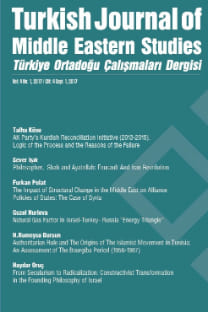Arabuluculuk Çatışması: Pan-Arap Uluslararası Uydu TV Yayıncılığının Aracılığıyla Filistin Bölünmesinin Arabuluculuğu
This paper explores the behind the scenes interplay between regional and Palestinian political actors through pan-Arab transnational satellite TV (PASTV) news media, during the Palestinian internal conflict sparked in 2007 between Fatah and Hamas. Primary focus is on the influential role played by PASTV journalism in shaping Palestinian political decision-making process during this interplay. The interplay between politics and news media forms the core discussion in the theory of ‘mediatisation’, which -informs the theoretical framework in this paper, also refers to such interplay as a struggle between ‘political logic’ and ‘news media logic’. Such a struggle reflects the difference between "neutral" and "participant" journalism, and how that might influence political processes and political culture. The paper examines, from an informant’s perspective, how such transnational political communication took place, also the aims each political player attempted to achieve through the mediated reality shaped in PASTV journalism. The paper demonstrates with evidence how the role played by PASTV journalism was not an accidental occurrence, but an extension of their regional financers’ interests in the conflict. While trying to reinforce the political clout of their Palestinian ally and maximize public sympathy towards his position, the exacerbation and perpetuation of the split become consequences.
Anahtar Kelimeler:
Mediatisation, Transnational TV Journalism, Media logic, Political logic, mediated reality
A Mediatised Conflict: The Mediatisation of Palestinian Split in Pan-Arab Transnational Satellite TV Journalism
This paper explores the behind the scenes interplay between regional and Palestinian political actors through pan-Arab transnational satellite TV (PASTV) news media, during the Palestinian internal conflict sparked in 2007 between Fatah and Hamas. Primary focus is on the influential role played by PASTV journalism in shaping Palestinian political decision-making process during this interplay. The interplay between politics and news media forms the core discussion in the theory of ‘mediatisation’, which -informs the theoretical framework in this paper, also refers to such interplay as a struggle between ‘political logic’ and ‘news media logic’. Such a struggle reflects the difference between "neutral" and "participant" journalism, and how that might influence political processes and political culture. The paper examines, from an informant’s perspective, how such transnational political communication took place, also the aims each political player attempted to achieve through the mediated reality shaped in PASTV journalism. The paper demonstrates with evidence how the role played by PASTV journalism was not an accidental occurrence, but an extension of their regional financers’ interests in the conflict. While trying to reinforce the political clout of their Palestinian ally and maximize public sympathy towards his position, the exacerbation and perpetuation of the split become consequences.
Keywords:
Mediatisation, Transnational TV Journalism, Media logic, Political logic, mediated reality,
___
- Professor Ilan Pappe: (PhD first supervisor) Historian in Middle East politics, Institute of Arab and Islamic Studies (IAIS), University of Exeter, UK, i.pappe@exeter.ac.uk
- Professor Clive Barnett: (PhD second supervisor) Professor of Social Theory, University of Exeter, UK, c.barnett@exeter.ac.uk
- ISSN: 2147-7523
- Başlangıç: 2014
- Yayıncı: Sakarya Üniversitesi Ortadoğu Enstitüsü adına Ali Balcı
Sayıdaki Diğer Makaleler
İran'ın Direniş Ekseninde Süleymani Kırılması: Ortadoğu'da Vekalet Savaşlarında Yeni Dönem
Yeni Dünya Düzeninde Türk Dış Politikası
Irak'ın İlk Askeri Darbesi: 1936 Bekir Sıtkı Darbesi
“Meşrute-i İrani” (İran Usulü Meşrutiyet)
İran'ın Direniş Ekseninde Süleymani Kırılması: Ortadoğu'da Vekalet Savaşlarında Yeni Dönem
Irak'ın İlk Askeri Darbesi: 1936 Bekir Sıtkı Darbesi
Irak’ın İlk Askeri Darbesi: 1936 Bekir Sıtkı Darbesi
